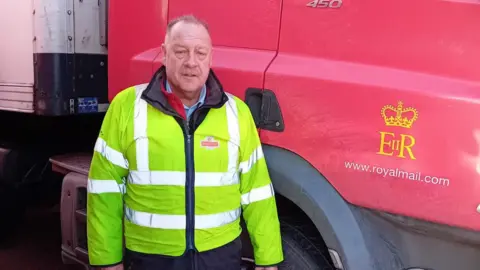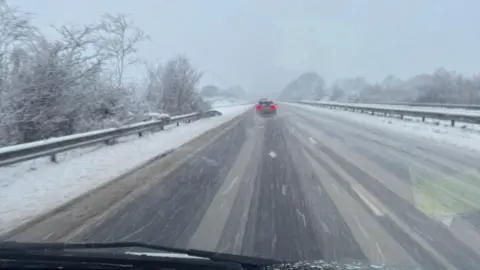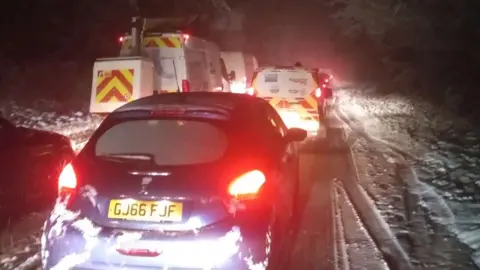Stuck drivers had 'ice road trucker' conditions
 Dave Surtees
Dave SurteesPeople feared they would be stuck overnight in their vehicles after snow brought major roads to a standstill in the South West.
Multiple roads including the A30, A38 and A380 in Devon and Cornwall were closed on Wednesday evening as ice and snow covered parts of the region.
Susie Fytche said it took her and her husband Mick nearly seven-and-a-half hours to travel about 36 miles (58km) between Brixham and Exmouth, while Royal Mail worker Dave Surtees said it was "like being an ice road trucker".
Highways bosses in South West England apologised to people who got stuck on the roads and said the poor weather arrived earlier than expected.
Weather warnings for snow and ice had been issued by the Met Office for parts of Devon and Cornwall on Wednesday as temperatures dropped below 0C (32F).
Warnings for ice were also issued until 11:00 GMT on Thursday along with a fresh one for ice across Devon and Cornwall between 03:00 and 11:00 on Friday.
'No information'
Ms Fytche, who is 78 and diabetic, said she, her husband and their dog Max had been trying to travel home to Exmouth when they got stuck on the A380 at Telegraph Hill near Exeter.
They left Brixham at about 14:45 but did not get home until 22:10.
Ms Fytche said at one point, she feared they would be stuck on the road overnight.
"Other than what we heard on the radio, we were getting no information from the emergency services on the road."
She added: "We didn't have any food in the car apart from some tomatoes and glucose gel.
"We had been shopping and got some dog food for Max, so he was alright, but we didn't fancy eating it ourselves."
Devon and Cornwall Police and Devon County Council Highways said it had not been "possible to subsequently pre-deploy the resources to vulnerable locations as had originally been planned" due to the snowfall occurring earlier than expected.
They added snow ploughs became stuck in queues and highways staff had worked "relentlessly to get things moving" with gritters continuing to operate in some areas including Telegraph Hill, Whiddon Down and Dartmoor.
 Spencer Clark
Spencer ClarkSpencer Clark said he was stuck on the A30 near Bodmin in Cornwall for more than two hours.
The 61-year-old had travelled to the area from where he lives in Exeter and had been heading on to Gloucester in a van when he got stuck at about 16:15.
Mr Clark, who eventually got to Gloucester at about 22:30, said: "What I don't understand is I was prepared for the conditions because the authorities had been talking about for a while.
"I took an extra flask of coffee, blankets, a shovel, cardboard boxes and food in my van.
"But despite the warnings, the powers that be did not seem to be prepared - it took nearly two hours for a snow plough to appear with a police escort."
 Spencer Clark
Spencer ClarkMr Surtees said he travelled to a number of places in Devon and Cornwall including Truro, Plymouth and Exeter between 11:15 and 22:50 while on shift for Royal Mail.
He said he was able to get the work he needed to do done despite the conditions, but he had to take it steady in his lorry.
"I was out on the road at 13:00 and by then it was getting quite horrific.
"It was like being an ice road trucker as the conditions were treacherous.
"Safety always comes first, so I kept my speed down to 30mph (48kph) at points and you could hear the ice crunching under the wheels."
 Mick Fytche
Mick FytcheAndy Cole, network operations control centre manager for Devon County Council, said the authority was sorry for the disruption caused to people who got stuck on roads.
He said it had been a "very challenging afternoon" which was not helped by an 80-ton abnormal load jack-knifing on the A380.
Mr Cole added: "We put down lots of salt in advance of this but the heavy rain and sleet washed most of that away.
"Once we stop vehicles travelling on the road it becomes extremely challenging to get the gritters to deal with it but we got there in the end.
"The rain came in at a lot high intensity than was expected and as soon as it hit the hills and the cold front it turned to snow and the intensity of that snowfall was too much for the salt treatments that were done to deal with."
Follow BBC Cornwall on X, Facebook and Instagram. Follow BBC Devon on X, Facebook and Instagram. Send your story ideas to [email protected].
